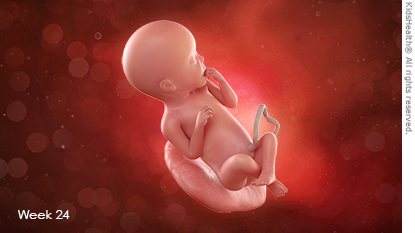- Home
- Humana Medicaid
- Kentucky Medicaid
- Medicaid extras
- Health and wellness
- Parents Home
- Para Padres
- A to Z Dictionary
- Allergy Center
- Asthma
- Cancer
- Diabetes
- Diseases & Conditions
- Doctors & Hospitals
- Emotions & Behavior
- First Aid & Safety
- Flu (Influenza)
- Food Allergies
- General Health
- Growth & Development
- Heart Health & Conditions
- Homework Help Center
- Infections
- Newborn Care
- Nutrition & Fitness
- Play & Learn
- Pregnancy Center
- Preventing Premature Birth
- Q&A
- School & Family Life
- Sports Medicine
- Teens Home
- Para Adolescentes
- Asthma
- Be Your Best Self
- Body & Skin Care
- Cancer
- Diabetes
- Diseases & Conditions
- Drugs & Alcohol
- Flu (Influenza)
- Homework Help
- Infections
- Managing Your Weight
- Medical Care 101
- Mental Health
- Nutrition & Fitness
- Q&A
- Safety & First Aid
- School, Jobs, & Friends
- Sexual Health
- Sports Medicine
- Stress & Coping
Pregnancy Calendar: Week 24
Your Baby's Development
The inner ear — which controls balance — is now completely developed.
So your baby might be able to tell when he or she is upside down or right side up while floating and making movements in the amniotic fluid.

Your Body
An important prenatal test, glucose screening, is usually done sometime between weeks 24 and 28. This test checks for gestational diabetes, a temporary type of diabetes during pregnancy that can cause problems in a newborn, such as low blood sugar. Gestational diabetes can make a woman more likely to need a C-section because it can lead to the growth of very large babies.
For the glucose screening test, you'll drink a sugary solution and then have your blood drawn. If your blood sugar levels are too high, you'll have more tests, which your health care provider will discuss with you. Gestational diabetes usually can be controlled with a well-planned diet and regular exercise, but some pregnant women will need medicine, such as daily insulin, during the pregnancy.

© 1995- The Nemours Foundation. KidsHealth® is a registered trademark of The Nemours Foundation. All rights reserved.
Images sourced by The Nemours Foundation and Getty Images.

